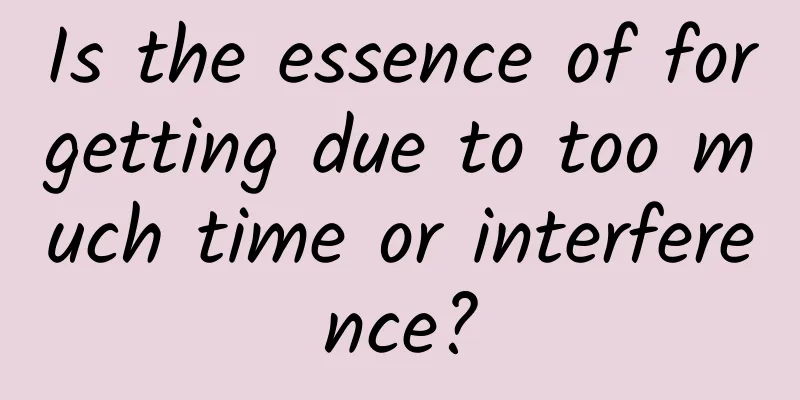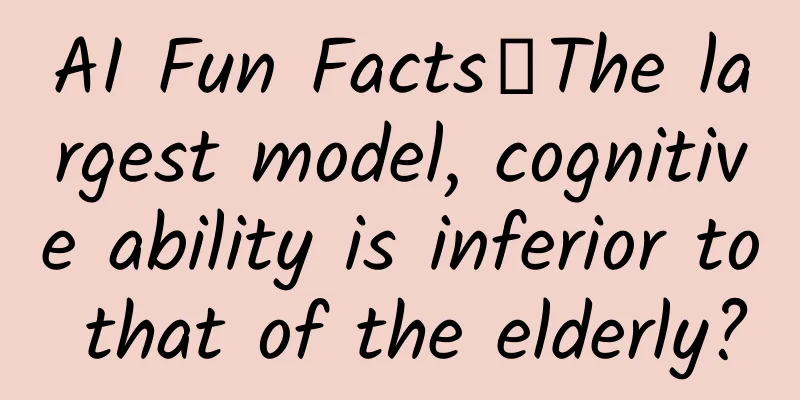Is the essence of forgetting due to too much time or interference?

|
In our daily lives, "forgetting" is a common and common topic. Everyone will forget some things more or less. For example, when asked "What did you eat last Friday night?" or "What was the first thing you did when you got home last night?", we can't recall them quickly, or even remember the answers. So what exactly is "forgetting"? Why do we forget? How can we reduce forgetting? Forgetting and Remembering When talking about forgetting, closely related to it is memory. So what is forgetting and what is memory? In psychology, forgetting refers to the inability or error in restoring and retrieving memorized content under certain conditions; while memory is the human brain's retention and reproduction of past experiences. According to the length of time that information is maintained, we usually divide memory into sensory memory, short-term memory, and long-term memory. Sensory memory refers to the information received by the human sensory system such as vision, hearing, and touch. For example, we can remember what we just said , and this memory can only last for a few seconds; while short-term memory has a longer time process (a few seconds to a few minutes) and a more limited capacity, and generally requires constant repetition in the brain to maintain, such as recording the phone number just memorized ; information that is stored for a long time is called long-term memory, such as you won the first place in the class in the final exam of the third grade of elementary school . In addition, according to the way information is stored and recalled, it can also be divided into procedural memory (memory of riding a bicycle) and declarative memory (memory of what happened to oneself). Why do we forget things? So, how does forgetting happen, and why can't we remember the little things in life? The famous psychologists Waugh and Norman conducted a primary memory research experiment in 1965, mainly to study whether forgetting is caused by the amount of information or the time interval. First, at the beginning of the experiment, the subjects will hear a series of numbers, and then suddenly, after hearing a number (8), they will hear a prompt tone. Then all the subjects need to do is remember the number (4) after the prompt tone. In this experiment, there will be two interference items of different natures, namely the number of numbers between the prompt tones and the time interval between numbers. And these two factors will affect the experimental results. Specifically, increasing the number of numbers will increase interference and make it impossible to remember the numbers; while increasing the time interval will prolong the reaction time to remember the numbers. Through this experiment, we can observe the effects of forgetting and interference on memory. The results show that the time interval between numbers has basically no effect on memory. What really affects memory is the number of numbers between two 8s. Therefore, it can be proved that the content of memory is not completely forgotten, but is interfered by other memory information. In addition to the mutual interference of memory information, our limited short-term memory capacity can also lead to forgetting. Miller and others found through research that the short-term memory capacity of normal adults is within 7±2 units, where a unit can be a number, a letter, a word or a sentence. When the memory capacity exceeds this range, we will have unclear memories or even forget. For example, within a certain period of time, it will take less time to successfully recite 7 sentences than to recite 10 sentences. In daily life, we always find that we can’t remember some trivial things. That’s because these memories are too many, exceeding the capacity of short-term memory, and are temporarily stored in short-term memory without entering long-term memory. At the same time, they are disturbed by other irrelevant information and therefore cannot be remembered. In addition to the experiments introduced above, there are many theories related to forgetting. The motivation theory holds that forgetting is caused by the repression of emotions or motivations. For example, a mother loses her beloved son in a car accident, but she thinks that the child is working in another place and does not remember the fact that he has passed away . The retrieval failure theory holds that the information stored in long-term memory will never be lost, and forgetting is caused by the loss of clues or wrong clues. For example, when reciting ancient poems, we clearly know the answer, but we just can't remember it. When others remind us of the first word or the first two words, we can quickly remember the answer. It is worth noting that due to individual differences among people, the reasons for forgetting are often different. I believe that through the understanding of theoretical knowledge, we can all have a rough theoretical attribution for our own forgetting behavior. So how can we reduce the occurrence of forgetting? How to reduce the occurrence of forgetting? We know that when information is stored in long-term memory, it will not be easily forgotten. Therefore, if we want to remember more things, we need to enhance long-term memory through a series of methods and minimize the interference of other information on memory in the process. First of all, we need to organize effective review, allocate review time reasonably and pay attention to eliminating the influence of previous and next materials. The so-called influence of previous and next materials is proactive inhibition and retroactive inhibition. If the material learned first interferes with the recognition and recall of the material learned later, it is proactive inhibition, otherwise it is retroactive inhibition. Then we can adopt early learning and review before going to bed to eliminate the influence of proactive inhibition and retroactive inhibition. Secondly, we should be good at using external memory methods, such as taking notes, making outlines, or marking information with highlighters in learning; in daily life, we can write diaries to record important events or use mobile phone memos to strengthen memory. In addition, ensuring adequate sleep, nutritional supplements, and proper relaxation are the prerequisites and foundations for reducing forgetting and enhancing memory. So, let us take action, develop a good schedule and use various methods to prepare for enhancing long-term memory! References [1] Marilou Poitras et al.(2020).A Replication ofWaugh and Norman(1965) Primary Memory study.The Quantitative MethodsforPsychology,16(2), pp.r1-r7. [2] Pan Yun, Li Mengmeng, Yang Huanyu, Zhang Jian & Qishi San. (2021). Retrieval-induced forgetting: Inhibition and interference. (eds.) Abstracts of the 23rd National Psychology Conference (Volume 2) (pp. 118-119). [3] Shen Ying. (2017). Application analysis of memory rules in psychological teaching. Shanxi Youth (08), 173. This article is a work supported by Science Popularization China Starry Sky Project Author: Tang Yicheng Reviewer: Mao Lihua, Associate Professor, School of Psychology and Cognitive Science, Peking University Produced by: China Association for Science and Technology Department of Science Popularization Producer: China Science and Technology Press Co., Ltd., Beijing Zhongke Xinghe Culture Media Co., Ltd. |
<<: There is nothing "worldly" in today's article...
Recommend
One code for all travel across the country, do you need to be quarantined when returning home? The latest situation of 31 provinces, autonomous regions and municipalities is here!
The Spring Festival is coming soon. Are you plann...
One picture will help you understand the National People’s Congress and the Chinese People’s Political Consultative Conference!
The two sessions have begun! How much do you know...
"Extreme" strong winds + temperature drop! Everyone who went out to work today, how are you?
Today's Tadpole Quiz is here! Every Friday, T...
The flagship of domestic products, both intelligent and brave, Fangcheng Baobao 8 is officially launched, with a starting price of 379,800 yuan
On November 12, BYD and Huawei jointly launched t...
[2014 WOT Shenzhen Station Lecturer Interview] Huo Dianyan: New technology is the core value of mobile games
From November 21 to 22, 2014, the 2014 WOT Global...
It only takes 5 minutes to teach you how to play Super Fan Pass
On September 21, Weibo launched a new information...
Download the full version of the package dating method on Baidu Cloud
Introduction to Package Date This course is a cou...
You don’t use the ready-made teachers, and you still have the nerve to say that you “can’t find the door to product operation”?
Among the BAT Big Three, Tencent has been critici...
App Store 10-year data report: In the past year, games only accounted for 31% of downloads, but revenue was as high as 75%.
Since its launch in 2008, Apple App Store has bee...
How much does it cost to get a license: How to do efficient SEO work? What aspects can be done better?
The first step in SEO optimization is to select a...
It’s the season for picking wild vegetables again. How do you tell whether they are edible?
The good times of “everyone digs with a hoe” have...
Zhongshan travel mini program development and customization details, what are the tourism WeChat mini programs?
The emergence of mini programs has simplified the...
What’s the matter with the traffic limit on TikTok? What should I do if Douyin has limited traffic? How can I restore the limit?
Douyin will allocate traffic based on the perform...
Pharmaceutical Technology Week | Use "whitening pills" when you get tanned? NO, NO, NO!
Author: Ma Shuangshuang, Chief Pharmacist, Pharma...
Down jackets can’t be machine washed, and they can’t be dry cleaned either?
Audit expert: Zhu Guangsi Member of Beijing Scien...









